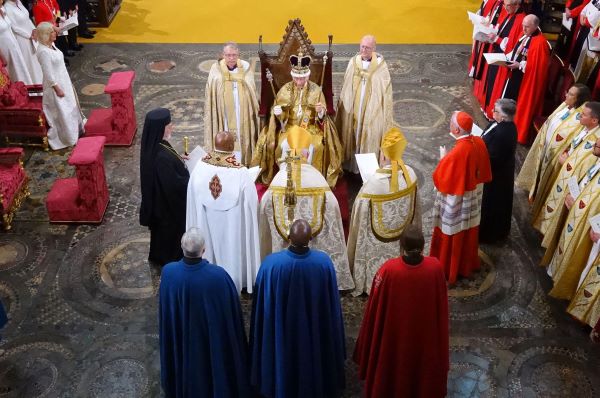King Charles III was crowned this morning in Westminster Abbey, with his consort Queen Camilla.
The Coronation expressed the King’s duty of service after the model of Christ. The liturgy was commissioned by the Archbishop of Canterbury, Justin Welby, who presided.
Although avowedly belonging to the Church of England, the Coronation featured contributions from leaders of other Christian denominations – including Cardinal Vincent Nichols – in the blessing after the King had been crowned, while other religions were involved in civic elements of the service.
Other innovations included the use of Welsh and Scots and Irish Gaelic in the liturgy, while newly-composed gospel music and a Greek setting of Psalm 71 (in memory of the late Duke of Edinburgh) featured alongside traditional Coronation music.
Archbishop Welby’s sermon, the first preached at a Coronation for a century, emphasised that Christ was a king “anointed not to be served but to serve”.
“He creates the unchangeable law that with the privilege of power comes the duty to serve,” he said. “Service is love in action.”
Lambeth Palace, who published the liturgy, said that it had evolved from the crowning of King Edgar in 973 and the service made wide reference to the British Isles’ Christian history. The procession into the Abbey featured the Augustine Gospels, the sixth-century book of Latin gospels sent by St Gregory the Great to aid the conversion of England. The volume has been in England longer than any other book.
Archbishop Welby anointed the King in a rite derived from the anointing of Solomon in the Book of Kings. Contrary to earlier speculation, this moment was screened from the congregation as in previous coronations.
As he received the regalia of office, the King was vested with quasi-priestly robes: a stole made for the occasion and a gold supertunica made for his great-grandfather’s Coronation in 1911.
After the King had been crowned, Cardinal Nichols was one of four ecumenical leaders who blessed him with Archbishop Welby and the Archbishop of York, Stephen Cottrell.
Earlier, prior to the Coronation Oath in which the King swore to uphold “the Protestant reformed religion”, Archbishop Welby gave an explanatory preface saying that the pledge to maintain the Church of England’s settlement had “stood for centuries and [was] enshrined in law”, adding that the Church was committed to the protection of all religious practice.
The service was arranged around an Anglican Eucharist according to the Book of Common Prayer. Both the King and Queen received communion.



 Loading ...
Loading ...